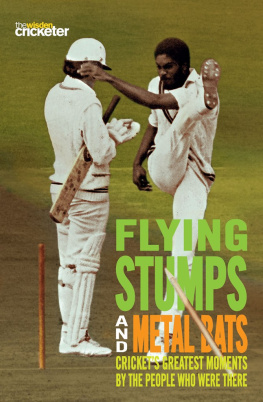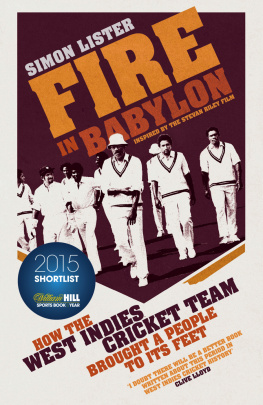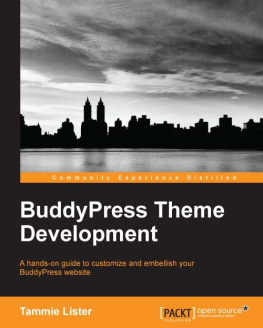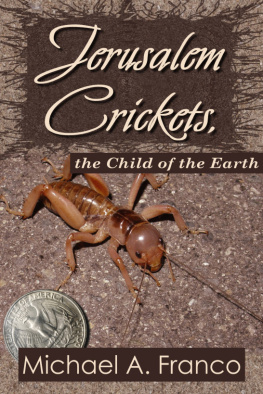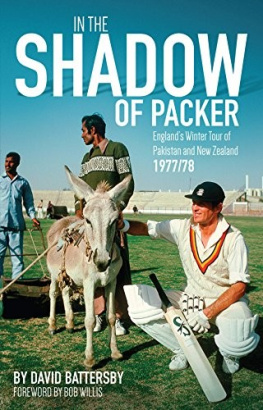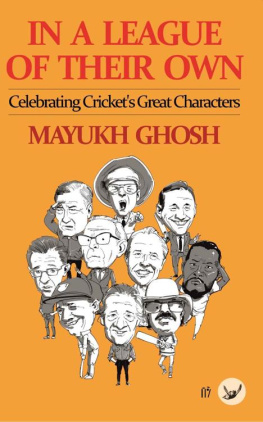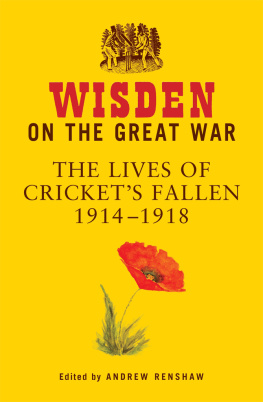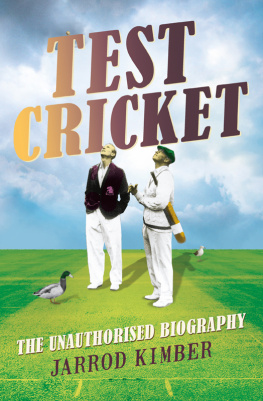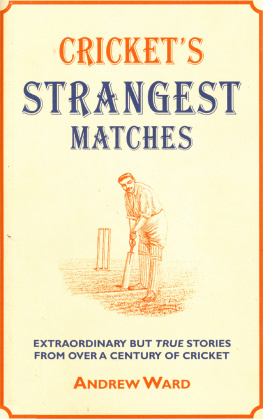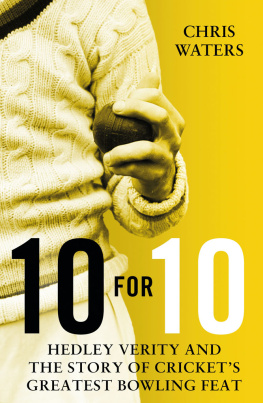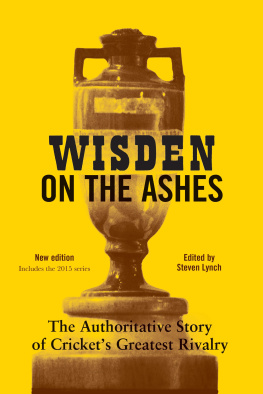
The articles from the Wisden Cricketer that make up this collection are a bit different from other parts of the magazine. The reason, I think, is because they are stories that the players tell by themselves. When it works well, Eyewitness (as regular readers of the Wisden Cricketer know it) has the feel of a group of people talking around a pub table while enjoying a pint. An anecdote here, an interjection there, a contradiction, then perhaps a joke followed by a put-down. The task of the compiler is to place together these jigsaw pieces of recollection to come up with a colourful picture.
Thats the theory. The trouble with Eyewitness is that some of the eyewitnesses themselves have a terrible habit for making things up. Now, Im not saying that the ex-cricketers of the world are a collection of mendacious obfuscators, its just that a portion of them dont have great memories. Heres one example among many. It was an interview with a former county captain who insisted forcefully for several minutes that he had been caught at midwicket by a fielder who in actual fact was not playing in the match. The discussion only ended after he put the receiver down and went to the next room to look up the game in Wisden. Even then he suspected a printing error.
So the memory can play tricks when its working at all, that is. I was recently left slightly short of material by a player who was one of seven victims in the middle of a record-breaking spell of bowling by Pat Pocock. Despite the days momentous events, he had absolutely no recollection of taking part in the game. So I rang his brother who had also been bowled for nought. He couldnt remember a blessed thing either.
If only they were all like Raymond Illingworth. Raymond is something of an Eyewitness favourite, partly because hes played in some dramatic cricket matches and partly because he can remember almost every leg-bye and off-break he witnessed.
It was Scarborough, he might begin. I was slightly delayed because of a tailback outside Filey. There was light drizzle until about ten past twelve, then I brought myself on from the Trafalgar Square End and had four for 12 by lunch. Potato salad and ham it was.
The other thing about Raymond is that hes never too busy to talk. I once interrupted him while he was cleaning the car outside his holiday home in Spain (I dunno, he grumbled, it was bloody spotless when the kids took it out...), but he still gave chapter and verse. When I mentioned this to a colleague, he told me of a phone interview hed done while Raymond was in the bath. On the tape, he had an account of the Ashes tour of 197071 as well as an intimate collection of sploshings and latherings.
Raymond is helpful, articulate and generous when hes describing his career (although to be mischievous for a moment, his recall for games where he took nought for 112 is slightly sketchy), and he is the rule rather than the exception. Only two out of the dozens of people who have appeared in Eyewitness should have been forced to stand in the waste-paper bin with their backs to the rest of the class. One was a former England captain (and former personal hero) who took great exception to answering the phone to an ignorant stranger. The terse and spiky interview that followed, laced with sighs and sarcasm, took weeks to recover from.
The second naughty boy was a bit-part player who demanded hundreds of pounds for his muddled contribution, made over a mobile phone in a garage forecourt outside the village of Liphook in Hampshire. I was in the middle of explaining the constraints of the magazines budget when he cursed loudly, announced that Id caused him to fill his tank with diesel rather than unleaded, then hung up.
But these moments are very rare. I cant speak for Lawrence Booth, Nick Hoult or Huw Turbervill, but I suspect that, like me, they find it a bit of a treat to be able to talk about great cricket matches with the great men who played in them and to get, just for a quarter of an hour or so, a feel for their character away from the crease. And occasionally you receive more than you expected. I will always keep the recording of the moment that Mike Gatting was attacked on his sofa by his dog. At first I was horrified, thinking I was listening to a violent burglary taking place.
Mike:... So Steve Waugh somehow got his hands under it and caught a bloody good catch actually.
Me: Was that a pull, Mike, or a shot on the off side?
Mike: OI! OI!... ARRGHHH!... (sounds of a commotion and barking) GET OFF! DOWN!!! YOU BAD BOY!!!
Me: Mike? Mike? Hello...?
Mike: (GRRRR!) Sorry about that. Ive got some biltong knocking around. Nightmare! Away! Bad boy! Anyway, yeah, so um, as I say, I pulled it...
The explanation turned out to be that Gatts meaty mid-morning snack had proved too much of a temptation for his slavering pooch. Hard as I tried, it was impossible to work this part of the interview into the final copy. It might have distracted the reader from the game. And that, I suppose, is what Eyewitness is all about. The game. It celebrates the cricket match rather than the cricketer. Its not about the individual, but the individuals role in a greater thing. And there are few greater things than a cricket match vividly recalled by those who best knew the moment.
Simon Lister
June 2008
CHAPTER 1

I thought: Thats all I need after that
a speeding ticket.
The policeman said: I told my mate
that was Knotty and Denness well
stop them and ask them what
happened at Headingley.
They let me off a ticket.
England captain Mike Denness following Englands semi-final defeat to Australia in the inaugural cricket World Cup, 1975
overleaf:
Clive Lloyd picks up the first World Cup trophy from Prince Philip
The short and sweet World Cup entrance
West Indies win the first World Cup, England, 1975
The 2007 World Cup was widely panned for being too long a far cry from the inaugural competition in 1975. The Prudential Cup, with its two-week, eight-team format, was more akin to todays Twenty20 World Cup. And it was greeted with similar ambivalence by most involved. One-day games had been part of the English county scene for more than a decade but for most other countries limited-overs cricket was a dubious novelty. India and Australia were wary of one-dayers, and Ian Chappells main focus that summer was on the subsequent four Tests against England, although Australians never like losing...
Keith Fletcher (England batsman): Wed been playing the Sunday League for six years and the Gillette Cup for twelve, so we had more one-day experience than some of the others. There was lots of global interest but not as much hype, television and media coverage as now.
Chris Old (England bowler): Lots of the older players said one-day cricket wouldnt last. Certain players were having trouble adapting. There was a tremendous atmosphere for the tournament. We had a reception at Buckingham Palace just before the first game.
Mike Denness (England captain): I was playing for Kent at Colchester and I walked off with Asif Iqbal because it was snowing two inches fell and I thought: What a shame with the first World Cup five days away. As it turned out, it was 80F at Lords for the opening match and a terrific summer. Most players were supportive of the 60-over format. It had spectator appeal and the players preferred performing in front of a crowd. We didnt practise specifically for the format but we did work out some strategies, unlike the Australians. Chappell wasnt a fan at all but they still made the final.
Next page
